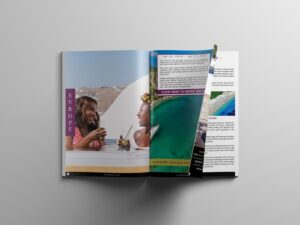
As travel agent training risk management takes center stage, this theme invites readers into an insightful exploration of the key components that shape the travel industry. Effective training not only equips agents with the necessary skills but also emphasizes the importance of managing risks that can arise during travel. Understanding these elements is crucial for fostering a safe and successful travel experience for both agents and their clients.
Travel agents play a pivotal role in navigating potential pitfalls, ensuring client safety, and adapting to evolving travel dynamics. This discussion will delve into the fundamentals of training, the critical aspects of risk management, and how these factors contribute to career success in the ever-changing world of travel.
Travel Agent Training Fundamentals
Travel agent training programs are crucial in shaping knowledgeable and competent professionals who can navigate the complexities of the travel industry. These programs cover essential components that equip agents with the necessary skills and knowledge to thrive in their roles.
Essential Components of Travel Agent Training Programs
A well-rounded travel agent training program typically consists of various essential components, including:
- Destination Knowledge: Understanding popular travel destinations, including geography, culture, and attractions.
- Booking Systems: Familiarity with the various booking tools and systems used in the industry.
- Customer Service Skills: Training in effective communication and problem-solving to enhance client interactions.
- Sales Techniques: Learning strategies to sell travel packages and upsell services effectively.
- Compliance and Regulations: Knowledge of legalities and regulations governing the travel industry.
Key Skills Required for Effective Training in the Travel Industry
Effective training in the travel industry requires a blend of specific skills that ensure agents can perform their roles efficiently. Key skills include:
- Communication: Strong verbal and written communication skills are essential for interacting with clients and suppliers.
- Analytical Skills: The ability to analyze client needs and preferences to provide tailored recommendations.
- Attention to Detail: Ensuring accuracy in bookings and travel arrangements to prevent issues.
- Time Management: Effectively managing multiple tasks, including bookings, inquiries, and follow-ups.
- Adaptability: Being flexible to changes in travel plans and regulations.
Significance of Risk Management Training for Travel Agents
Risk management training is vital for travel agents as it prepares them to identify, assess, and mitigate potential risks that may affect their clients. This training helps in developing strategies to enhance client safety and ensure smooth travel experiences. Understanding risk management not only protects clients but also safeguards the agency’s reputation and financial stability.
Importance of Risk Management in Travel
Risk management plays a critical role in the travel industry, primarily focused on ensuring client safety during their travels. It encompasses various strategies and practices aimed at minimizing potential threats to travelers.
Role of Risk Management in Ensuring Client Safety During Travel
The role of risk management is paramount in ensuring the safety of clients during their travels. By proactively identifying potential risks, travel agents can implement measures that enhance safety and reduce liability. This not only protects clients but also builds trust in the agent’s capabilities.
Common Risks Faced by Travel Agents and Their Clients
Travel agents and their clients face several common risks, including:
- Travel Disruptions: Issues such as flight cancellations and natural disasters can impact travel plans.
- Health Concerns: Outbreaks of disease or health emergencies affecting destinations.
- Legal Issues: Potential legal complications related to contracts and service agreements.
- Safety Risks: Concerns regarding crime, political instability, or unsafe environments in certain destinations.
Examples of Risk Management Strategies Tailored for Travel Agencies
Implementing effective risk management strategies is essential for travel agencies to safeguard their clients. Some strategies include:
- Comprehensive Travel Insurance: Encouraging clients to purchase travel insurance that covers various unexpected events.
- Emergency Response Plans: Establishing protocols for assisting clients during emergencies or crises.
- Regular Training: Conducting ongoing training for agents on risk assessment and management practices.
- Destination Research: Keeping updated on travel advisories and safety ratings for different destinations.
- Client Communication: Maintaining open lines of communication to address client concerns promptly.
Travel Advisory and Its Implications
Travel advisories are critical tools for both travel agents and clients, providing essential information about potential risks associated with specific destinations. Understanding travel advisories is key to making informed travel decisions.
Importance of Travel Advisories for Travel Agents and Clients
Travel advisories serve as a warning system to inform agents and clients about safety concerns, health risks, and other critical issues that may affect travel plans. Being aware of these advisories helps in making proactive adjustments to itineraries and ensuring client safety.
Impact of Travel Advisories on Travel Plans and Agency Operations
Travel advisories can significantly influence travel plans and agency operations by:
- Shifting Travel Trends: Clients may choose alternative destinations based on advisories.
- Operational Adjustments: Agencies may need to modify services or support for affected areas.
- Client Reassurance: Addressing concerns and providing solutions when advisories are issued enhances client relationships.
Staying Updated on Travel Advisories for Various Destinations
Travel agents must remain vigilant in monitoring travel advisories, which can be done through:
- Government Websites: Regularly checking official government travel advisory sites.
- Industry News: Subscribing to travel industry news and updates.
- Networking: Engaging with other travel professionals to share insights and updates.
- Social Media: Following relevant organizations and experts on social media platforms.
Travel Agent Career Opportunities
The travel industry offers a wide range of career opportunities for aspiring travel agents, each with its own set of responsibilities and requirements. Understanding these roles can help individuals make informed career choices.
Various Travel Agent Jobs and Their Responsibilities
There are several types of travel agent jobs, including:
- Corporate Travel Agent: Managing business travel for corporate clients and optimizing travel budgets.
- Leisure Travel Agent: Assisting individual clients with vacation planning, including bookings and itineraries.
- Travel Consultant: Providing expert advice on travel options and creating personalized travel experiences.
- Group Travel Coordinator: Planning and organizing travel for groups, such as tours or events.
- Online Travel Agent: Operating within an online framework to assist clients with bookings and inquiries.
Salary Expectations for Different Levels of Travel Agents
Salary expectations for travel agents can vary widely based on experience, location, and type of employment. Typically, salaries can range from entry-level positions starting around $30,000 to experienced agents earning upwards of $60,000 or more annually.
Job Market Trends for Travel Agents in the Current Economy
The job market for travel agents is evolving, with a growing demand for specialized services and personalized experiences. Agents who adapt to emerging trends and technology are likely to find more opportunities in the current economy.
Tools and Resources for Travel Agents
Equipping travel agents with the right tools and resources is essential for providing excellent service to clients.
Essential Travel Accessories for Clients
Here are some essential travel accessories that agents should recommend to clients:
- Portable Chargers: Ensuring devices remain powered during travels.
- Travel Pillows: Enhancing comfort during long journeys.
- Luggage Tags: Helping clients identify their bags easily.
- Travel Locks: Providing security for personal belongings.
- First Aid Kits: Preparing clients for minor medical emergencies.
Benefits of Using Travel Apps for Agents and Clients
Travel apps can streamline the travel experience for both agents and clients. Benefits include:
- Real-Time Updates: Instant notifications regarding flight changes and gate information.
- Easy Booking: Simplified processes for booking accommodations and activities.
- Expense Tracking: Assisting clients in managing travel budgets effectively.
- Itinerary Management: Accessing and sharing itineraries easily.
Importance of Travel Adapters in International Travel
Travel adapters are crucial for international travel, allowing clients to use their electronic devices across different countries. Agents should educate clients about the various types of adapters and their uses, ensuring their devices remain functional during their travels.
Travel Trends and Insights
Keeping up with current trends in travel and leisure is essential for travel agents to offer relevant advice and services to clients.
Current Trends in Travel and Leisure
Travel trends are constantly evolving, and agents should be aware of:
- Sustainable Travel: Growing interest in eco-friendly travel options and responsible tourism practices.
- Wellness Travel: Increasing focus on health and wellness experiences during travels.
- Remote Work Travel: The rise of “workations,” where individuals combine work and leisure.
- Adventure Travel: A growing demand for unique and adventurous travel experiences.
Insights on Travel and Transport Options Available to Clients
Travel agents need to stay informed about the transport options available to clients, including:
- Public Transport: Knowing local transportation methods in various destinations.
- Car Rentals: Understanding rental agreements and options for clients.
- Ride-Sharing Services: Familiarity with popular ride-sharing apps for easy commuting.
- Alternative Transport: Exploring options like biking or walking tours to enhance client experiences.
Utilizing Travel Blogs as Resources for Travel Agents
Travel blogs can be valuable resources for travel agents, offering insights and personal experiences that can help in trip planning. Agents should follow reputable blogs to gather destination tips, cultural insights, and the latest travel news.
Managing Travel Anxiety

Travel anxiety is a common concern among travelers, and agents can play a vital role in helping clients manage their fears.
Strategies for Travel Agents to Help Clients Deal with Travel Anxiety
Agents can employ various strategies to assist clients coping with travel anxiety, including:
- Providing Information: Offering detailed information about travel plans to alleviate uncertainties.
- Encouraging Preparation: Suggesting clients prepare checklists to ensure everything is organized.
- Mindfulness Techniques: Sharing relaxation techniques and breathing exercises that clients can use.
Role of Communication in Alleviating Client Concerns
Effective communication is key in addressing client concerns related to travel anxiety. Agents should maintain open lines of communication and be proactive in discussing any changes or updates regarding travel plans.
Creating a Travel-Friendly Environment for Anxious Travelers
Travel agents can assist in creating a travel-friendly environment for anxious travelers by:
- Suggesting Flexible Itineraries: Allowing for adjustments and changes as needed.
- Offering Support: Being available for clients to address concerns and provide reassurance.
- Recommending Relaxing Destinations: Choosing calming environments that promote relaxation.
Planning Travel Abroad
Planning international trips requires careful consideration of several factors to ensure a smooth travel experience.
Step-by-Step Guide for Agents in Planning International Trips
A systematic approach to planning international trips includes:
- Initial Consultation: Discussing client preferences, budget, and travel dates.
- Destination Research: Gathering information about the chosen destination, including visa requirements.
- Itinerary Creation: Designing a detailed itinerary that includes accommodations, activities, and transport.
- Booking Arrangements: Making all necessary reservations and confirmations.
- Final Review: Confirming all details with the client before departure.
Importance of Understanding Cultural Differences in Travel Planning
Understanding cultural differences is essential for providing a respectful and enriching travel experience. Agents should research cultural norms and practices to guide clients appropriately.
Legal Considerations and Documentation Required for Traveling Abroad
Agents must inform clients about necessary legal considerations, including:
- Passports: Ensuring clients have valid passports for international travel.
- Visas: Educating clients on visa requirements for specific destinations.
- Health Regulations: Informing clients about vaccinations or health clearances needed.
Creating Travel Brochures
Travel brochures are effective marketing tools that showcase destinations and services offered by travel agencies.
Key Elements to Include in Travel Brochures
Effective travel brochures should contain the following elements:
- Engaging Headlines: Captivating titles that draw attention to the destination.
- Vivid Imagery: High-quality images that capture the essence of the location.
- Descriptive Text: Informative content highlighting attractions, activities, and accommodations.
- Contact Information: Clear details on how potential clients can reach the agency.
Layout for an Effective Travel Brochure Promoting a Specific Destination
Creating an effective layout for a travel brochure involves:
- Cover Page: Eye-catching design with the destination’s name and a striking image.
- Interior Sections: Organized content that flows logically, covering various aspects like attractions and tips.
- Call to Action: Encouraging readers to contact the agency for more information or bookings.
Use of Visuals and Text in Travel Brochures
A balance of visuals and text is crucial in travel brochures. Engaging visuals attract attention, while concise, informative text provides necessary details, making brochures both appealing and informative.
Building a Travel Advantage Network
Establishing a travel advantage network is essential for travel agents to enhance their service offerings.
Ways Travel Agents Can Build and Maintain a Network of Suppliers and Partners
Agents can build and maintain a network through:
- Attending Industry Events: Participating in trade shows and conferences to connect with suppliers.
- Networking with Peers: Engaging with other travel agents and professionals in the industry.
- Utilizing Social Media: Connecting with suppliers and partners through professional platforms.
Advantages of Collaborating Within a Travel Advantage Network
Collaborating within a travel advantage network provides several benefits, including:
- Access to Exclusive Offers: Opportunities for agents to provide clients with unique deals.
- Shared Resources: Pooling resources for better service delivery and support.
- Enhanced Client Experiences: Leveraging partnerships to improve overall client satisfaction.
Strategies for Leveraging Relationships for Better Client Experiences
Agents can leverage relationships by:
- Personalizing Services: Tailoring offerings based on insights gained from partners.
- Continuous Communication: Keeping in touch with suppliers to stay updated on new offerings and changes.
- Building Trust: Establishing strong, reliable relationships that enhance client confidence in recommendations.
Final Conclusion
In conclusion, mastering travel agent training risk management is essential for anyone looking to thrive in the travel industry. By understanding the various risks involved and implementing effective strategies, agents can enhance client satisfaction and build a resilient career. As the landscape of travel continues to evolve, staying informed and prepared will undoubtedly set agents apart in a competitive market.
FAQ Corner
What are the key skills for travel agents?
Key skills include excellent communication, problem-solving, customer service, and knowledge of destinations.
How often should agents update their risk management knowledge?
Agents should regularly update their knowledge, ideally every few months, to stay current with industry changes.
What tools can assist with risk management?
Tools like risk assessment checklists, travel advisory apps, and client communication platforms can be beneficial.
Are there certifications for risk management in travel?
Yes, various organizations offer certifications tailored to risk management in the travel sector.
How can agents help clients with travel anxiety?
Agents can provide reassurance, offer tips for relaxation, and ensure thorough communication about travel plans.





